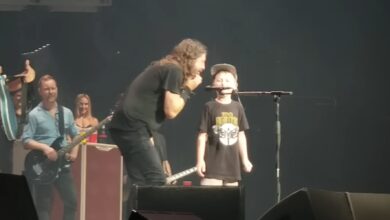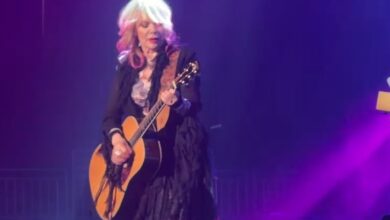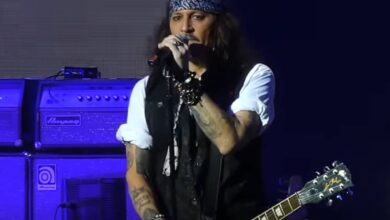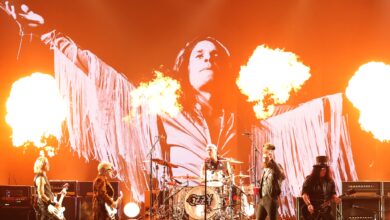Brian May’s Emotional “Love of My Life” Duet with Freddie Mercury’s Hologram Leaves Fans in Tears
When Brian May steps into the spotlight and gently takes his seat on the stool, a hush falls over the audience—anticipation hanging thick in the air. He cradles his guitar in his lap, fingers brushing the strings as if greeting an old friend. Slowly, he begins a tender acoustic version of “Love of My Life,” a song forever tied to the voice of Freddie Mercury, once sung side by side in harmony. In that moment, the stage feels sacred—as though memories themselves have gathered to bear witness.
As Brian’s voice enters the opening lines, there’s a fragile warmth in it—a vulnerability that feels like a whispered secret shared with the night. His tone is stripped bare, the years and echoes falling away, leaving only the purity of emotion. The crowd leans in, absorbed by each note, sensing the weight of what’s not visible yet undeniably present. In his voice, one hears longing, reverence, and the ache of absence.
Gradually, the melody swells, delicate at first, then firming into its full shape. At this point, the magic begins. Freddie Mercury—no longer flesh, but unmistakable in spirit—materializes as a visual tribute: his projected image gazing out, voice rising from the past. His presence feels tangible, as though he stands just beyond the veil. The contrast is staggering: Brian’s heartfelt softness melding with Freddie’s soaring operatic strength, two voices across time converging in one moment.
As Freddie’s voice fills the space, the audience finds its voice too, joining in—but softly, as if afraid to break the spell. Brian watches him, eyes distant and filled with emotion. There is a reverence in his posture, a humility that comes from knowing he is part of an endless dialogue, not its master. The projected Freddie reaches out—a gesture of friendship and recognition—and Brian responds, his fingers trembling slightly as though he feels the weight of that reach across years.
A hush returns as the song nears its end. The projected Freddie pauses, hand still extended, and Brian leans forward as if to touch it. The moment lingers—timeless, fragile, and deeply human. Some nights, Brian offers a gentle wave; other nights, the gravity of memory brings tears to his face. But always, the exchange is more than tribute—it is communion.
In the audience, eyes glisten, breath held. The stage glows with a halo of light. Strings, guitar, voice—interwoven—suspend time. For a few minutes, grief yields to celebration, and loss is transformed into presence. The past is not erased, only honored, and the boundary between then and now thins.
To see Brian perform “Love of My Life” in this way is to feel the weight of legacy. He is not re-enacting—he is conversing with memory. With every note, he carries not only the song but the stories of those who sang it before, those who listened, and those who will inherit it. His voice trembles because it is human. It is fragile. And in that fragility, it finds strength.
And then comes the final chord, held just a moment longer before it dissolves into silence. The amphitheater breathes with the absence. But then—applause. A wave of sound rising like a tide, fragile and triumphant. The audience responds not only to performance but to the shared remembrance of something irreplaceable.
Brian lowers his guitar, his shoulders heavy with feeling. The projected Freddie slowly fades, leaving empty space in his wake. But the space is full—full of memory, of love, of the echo of what was and what remains. Brian rises, takes a modest bow, his face a map of sorrow, joy, and gratitude.
Moments later, behind the scenes, alone in a corridor, Brian feels the rush of emotion—his voice catches, tears come. He wipes them away, straightens his shirt, and prepares to leave the stage, but the echo of what just transpired lingers in his heart and in the minds of those who witnessed it.





